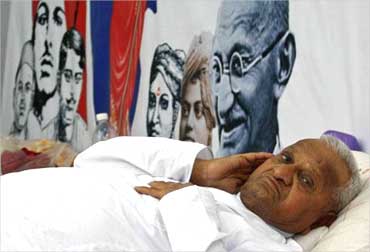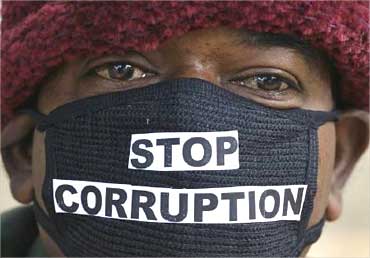Photographs: Uttam Ghosh/Rediff.com Rajni Bakshi
Long ago, before modern times, there was a woman who made a living by rearing a few cows and selling the milk. She was in the habit of adding water to the milk so she could increase her income.
But when her daughter was old enough to help in milking the cows the child refused to dilute it with water. "What are you afraid of? The King is not here to see what we do" said the mother.
"Yes, but God is watching us" said the little girl.
Last week this story was told by an old man at an anti-corruption meeting in a Delhi slum. This slum-dweller was quickly given a rejoinder by a veteran political activist who was also present at the meeting.
Sweet stories like this are not going to help us fight corruption, said the activist. This is not about dishonest people versus honest people: it's a battle against the global system which is giving too much power to some people and none to others.
. . .
Are we willing to fight corruption in everyday life?
That may be so, said the old man, but Anna Hazare's campaign has also reminded us that doing the right thing and being successful are often not the same things.
For too long now, most of us have not worried about doing the right thing as long as we get what we want. If this is to change we must all change.
Such an exchange is not rare these days. In different ways this sentiment is being expressed by a wide variety of people in homes and in public places.
Of course, the opposite view -- a feeling of despondency -- is also in circulation. Allegations against some members of the committee set up to draft the Lokpal bill have fuelled both scepticism and cynicism.
. . .
Are we willing to fight corruption in everyday life?
Image: Anna Hazare on fast in New Delhi.Photographs: Reuters
Some people might see the allegations as the work of vested interests who are trying to subvert changes that would prevent them from making money through corrupt means. And yet enough people now have a germ of doubt about the credibility of some civil society members in the drafting committee.
What lies between the extremes of cynicism on the one end and deep faith in moral renewal on the other?
In order to seek answers to this question we may have to step away from the glare and blare of front page headlines -- which tend to be about the big-ticket corruption.
This will take us to those rural areas where the poorest people are required to pay a bribe if they want a birth certificate for their new-born child. The person taking the bribe is often himself quite poor. This low-level government employee has in many cases himself or herself paid a bribe in order to get that position.
. . .
Are we willing to fight corruption in everyday life?
Photographs: Reuters
Similarly, women are known to pay a bribe of Rs 25,000 to Rs 30,000 in order to get the job of an 'anganwadi' worker. This 'investment' is then recovered by pilfering money from the government funds put at her disposal in order to provide anganwadi children a nutritious meal everyday.
In some parts of Bihar, committees of mothers were formed to act as watchdogs and ensure that all the money allocated is indeed spent on healthy meals for their children.
But in some cases the watchdog committee has itself became embroiled in the system of bribes and kickbacks.
The sphere of private businesses is somewhat similar. Kick-backs and 'cuts' are not the sole purview of government employees but are equally rife within the private sector as well.
. . .
Are we willing to fight corruption in everyday life?
This was graphically illustrated by the Hindi film Rocket Singh, released in 2009, in which a young man in his first job is appalled to find corruption at every level of the computer company.
All of these instances have one common point. They demonstrate the limitations of relying entirely on more 'policing' measures to counter corruption.
Birth certificates have been acquired without bribes where some community based organization mobilizes enough moral pressure and organizational strength to discourage those who may once have been corrupt.
Nutritious mid-day meals are delivered at anganwadis where group activity creates a social ethos which makes pilferage difficult, if not impossible.
. . .
Are we willing to fight corruption in everyday life?
Photographs: Reuters
The hero of Rocket Singh transformed his moral outrage into an alternative business model which won over customers by not being corrupt.
In a recently released Marathi film, Taryanche Bait, a child's demands for the fancy things of life drives his upright father towards corruption. But the film closes on the child himself rejecting the corrupt path -- partly by re-examining his own wants and desires.
So what that old man is saying is as practical as it seems lofty. For him the key achievement of Anna Hazare's campaign is not the drafting of a Lokpal Bill.
It is the reminder that every single one of us must re-examine the difference between what 'works', looks like success, and what is correct.
Yes, corruption in high places must be fought. But real victory will depend on how deeply we are all willing to grapple with, and resist, the insidious corruption in everyday life.







article